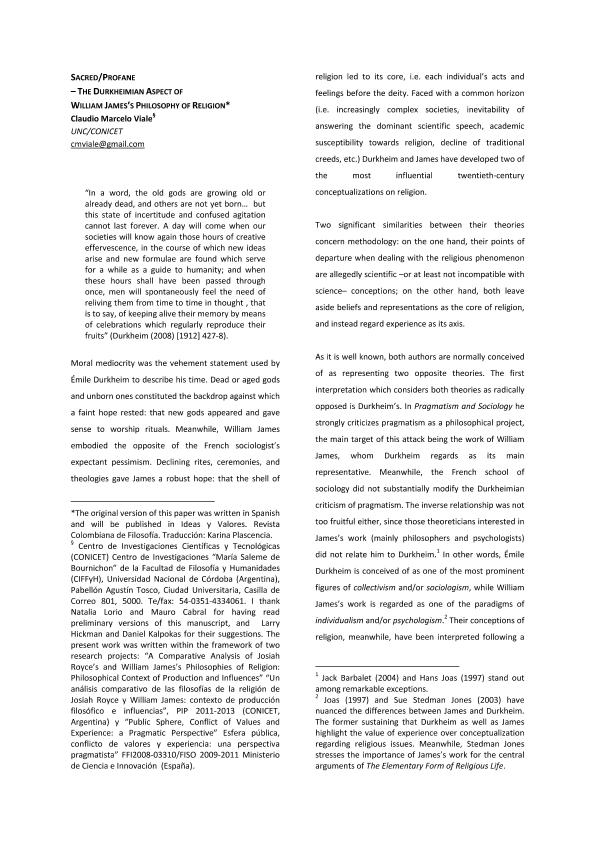Mostrar el registro sencillo del ítem
dc.contributor.author
Viale, Claudio Marcelo

dc.date.available
2019-02-04T16:15:51Z
dc.date.issued
2012-06
dc.identifier.citation
Viale, Claudio Marcelo; Sacred/profane: the durkheimian aspect of William James's Philosophy of religion; Central European Pragmatist Forum; Pragmatism today; 3; 1; 6-2012; 144-156
dc.identifier.issn
1338-2799
dc.identifier.uri
http://hdl.handle.net/11336/69283
dc.description.abstract
Without disregarding the differences between both perspectives, my hypothesis in this article is that James's philosophy of religion has a Durkheimian aspect. As it is well known, Durkheim considers the distinction between the sacred and the profane to be the axis of religion. For James, on the other hand, the core of religion seems to be the individual relationship with the deity, as mentioned before. The point of contact between both conceptions lies in the fact that the Jamesian definition implies a clear distinction between the sacred and the profane, which is a prototypically Durkheimian one which helps to tint the canonical version of a James who is irremediably imbued with individual Protestantism. In other words, the sacred/profane distinction is essential for James's philosophy of religion, and this point is best appreciated in his treatment of morality. Besides, this distinction is of vital importance to understand the relationships of James's philosophy with conservative as well as with liberal Protestantism. My argument unfolds in five parts. In the first one (Durkheim interprets James) I present essential aspects of the French sociologist's criticism of the pragmatist; in the second (Durkheim interprets religion) I characterize the axis of religion according to Durkheim, that is, the distinction between the sacred and the profane; in the third section (James: Durkheimianism and Individualism) I present some of the essential aspects of James's philosophy of religion and I advance my main hypothesis, namely that there is a Durkheimian aspect in James's philosophy of religion; in the fourth section (James and Durkheim: past, present, and future of religion) I briefly examine the importance of the Durkheimian aspect of the Jamesian conception of religion for its relationship with Protestantism. Finally, I put forward some conclusions.
dc.format
application/pdf
dc.language.iso
eng
dc.publisher
Central European Pragmatist Forum
dc.rights
info:eu-repo/semantics/openAccess
dc.rights.uri
https://creativecommons.org/licenses/by-nc-sa/2.5/ar/
dc.subject
Durkheim
dc.subject
William James
dc.subject
Pragmatism
dc.subject
Religion
dc.subject.classification
Estudios Religiosos

dc.subject.classification
Filosofía, Ética y Religión

dc.subject.classification
HUMANIDADES

dc.title
Sacred/profane: the durkheimian aspect of William James's Philosophy of religion
dc.type
info:eu-repo/semantics/article
dc.type
info:ar-repo/semantics/artículo
dc.type
info:eu-repo/semantics/publishedVersion
dc.date.updated
2019-02-01T14:00:37Z
dc.journal.volume
3
dc.journal.number
1
dc.journal.pagination
144-156
dc.journal.pais
Hungría

dc.description.fil
Fil: Viale, Claudio Marcelo. Consejo Nacional de Investigaciones Científicas y Técnicas. Centro Científico Tecnológico Conicet - Córdoba. Instituto de Humanidades. Universidad Nacional de Córdoba. Instituto de Humanidades; Argentina
dc.journal.title
Pragmatism today
dc.relation.alternativeid
info:eu-repo/semantics/altIdentifier/url/http://www.pragmatismtoday.eu/summer2012/Viale-Sacred_Profane_The_Durkheimian_Aspect_of_William_Jamess_Philosophy_of_Religion.pdf
Archivos asociados
